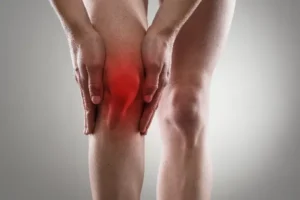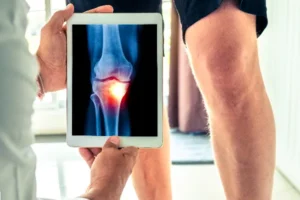Knee Pain from Osteoarthritis Causes, Symptoms, and New Treatment Options
 Knee pain can be extremely difficult to live with, affecting your ability to walk, sleep, and enjoy life’s simple moments. If you are one of the millions of Americans living with osteoarthritis (OA) of the knee, you understand how frustrating and limiting this condition can be. However, there is good news: advances in research are leading to new treatment options that may provide real relief.
Knee pain can be extremely difficult to live with, affecting your ability to walk, sleep, and enjoy life’s simple moments. If you are one of the millions of Americans living with osteoarthritis (OA) of the knee, you understand how frustrating and limiting this condition can be. However, there is good news: advances in research are leading to new treatment options that may provide real relief.
At Quality Research, we specialize in conducting clinical trials that explore new therapies for knee osteoarthritis. If you’re fed up with constant pain, figuring out what’s causing it is the initial step toward getting better treatment and improving your life. This blog will discuss what osteoarthritis is, the latest developments in knee osteoarthritis treatment, and how they can help improve your quality of life.
What Is Knee Osteoarthritis?
 The most common type of arthritis is Osteoarthritis (OA), and it’s a leading cause of long-lasting knee pain. It occurs when the protective cushion in the knee joint wears away, allowing the bones to grind together. This rubbing can lead to irritation, pain, puffiness, and tightness, which typically worsen over time.
The most common type of arthritis is Osteoarthritis (OA), and it’s a leading cause of long-lasting knee pain. It occurs when the protective cushion in the knee joint wears away, allowing the bones to grind together. This rubbing can lead to irritation, pain, puffiness, and tightness, which typically worsen over time.
Often referred to as “wear and tear” arthritis, osteoarthritis is more than just a natural consequence of aging. It’s a complicated disease that worsens over time, impacting not just the cartilage but also the nearby bone, tendons, and the joint’s covering. The National Library of Medicine says that several things can increase your chances of getting osteoarthritis:
- Age: The risk significantly increases after age 45.
- Obesity: Being overweight puts extra pressure on your knees.
- Previous injuries: Fractures or ligament damage can speed up joint wear.
- Genetics: If osteoarthritis runs in your family, you’re more likely to get it.
- Repetitive use: Jobs or sports that impose constant stress on the knees can lead to OA.
Knowledge and understanding the factors that cause OA can help prevent and manage osteoarthritis.
Common Symptoms of Knee Osteoarthritis
Finding knee osteoarthritis pain early can help you manage it more effectively. Look out for these signs:
- Persistent dull or sharp pain in the knee
- Swelling and tenderness, especially after physical activity
- Stiffness, mainly in the morning or after sitting for a long time
- A grating or clicking feeling when you move your knee
- Limited mobility or difficulty with stairs, walking, or getting up from a seated position
- A sense of instability or the feeling that your knee may give out
As time passes, these signs affect how well you move, your ability to do things on your own, and how you feel.
Diagnosing Knee Osteoarthritis
 OA diagnosis usually begins with a doctor checking your joints to assess how well they move, whether they’re swollen, and how far you can move them. X-rays or MRI imaging tests can help detect problems such as worn cartilage, bone growths, or joint misalignment.
OA diagnosis usually begins with a doctor checking your joints to assess how well they move, whether they’re swollen, and how far you can move them. X-rays or MRI imaging tests can help detect problems such as worn cartilage, bone growths, or joint misalignment.
Early diagnosis is crucial in helping to prevent the problem from worsening and in maintaining your well-being with the right care.
Treatment Options for Knee Osteoarthritis
Even though there is no cure for knee osteoarthritis, there are various treatments that can help control symptoms and make your knee work better:
- Lifestyle Modifications
- Weight Loss: Losing a small amount of weight can really lessen the stress on your knees.
- Gentle Exercise: Activities such as swimming, biking, and yoga can help strengthen muscles without straining the joints.
- Exercise Therapy: Working with a therapist on targeted movements and exercises can help build strength, improve balance, and enhance overall mobility.
- Medications
- NSAIDs: Common pain relievers like ibuprofen can be bought without a prescription to decrease swelling and pain.
- Creams: These help with pain in a specific area and are less likely to cause body-wide issues.
- Shots: Steroid and hyaluronic acid injections can help reduce swelling and improve joint mobility.
- Assistive Devices
- Utilizing a knee brace, cane, or orthotic inserts can relieve pressure and provide support during movement.
- Surgical Interventions
- If the problem is severe, knee replacement surgery, either partial or total, may be suggested. Surgery is typically only considered if other treatments have been ineffective.
The Role of Clinical Research in Treating Knee OA
 At Quality Research, new ideas are powerful. Our knee osteoarthritis studies let qualified individuals try the latest investigational treatment options under the care of expert doctors.
At Quality Research, new ideas are powerful. Our knee osteoarthritis studies let qualified individuals try the latest investigational treatment options under the care of expert doctors.
These studies are testing new treatments that may:
- Lower swelling better than the current medications on the market
- Improve joint function
- Stop or even fix damage to cartilage
- Provide relief that lasts longer with fewer bad effects
Participating in a trial may be particularly beneficial for individuals who have not found relief through traditional treatments.
Why Consider a Clinical Trial?
 There are many compelling reasons to participate in a research study:
There are many compelling reasons to participate in a research study:
- Access to investigational treatments that are not yet available to the public.
- Study-related care provided at no cost.
- Compensation for time and travel is provided in many studies.
- Be part of something bigger and help advance medical knowledge and care for others with osteoarthritis.
Clinical research is crucial for advancing the treatment of osteoarthritis, and your participation can make a substantial difference.
 Take the Next Step Toward Relief
Take the Next Step Toward Relief
If knee pain from osteoarthritis is preventing you from enjoying the activities you love, you don’t have to accept it as your new normal. Whether you’re looking into new treatment options or are interested in clinical research, Quality Research is here to assist you.
Visit our knee osteoarthritis study page to learn more, see if you qualify, or schedule a free consultation with our research team.

